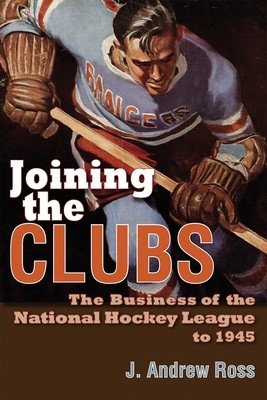
- We will send in 10–14 business days.
- Author: J Andrew Ross
- Publisher: Syracuse University Press
- ISBN-10: 0815633831
- ISBN-13: 9780815633839
- Format: 15.5 x 23.6 x 3 cm, hardcover
- Language: English
- SAVE -10% with code: EXTRA
Reviews
Description
How did a small Canadian regional league come to dominate a North American continental sport? Joining the Clubs: The Business of the National Hockey League to 1945 tells the fascinating story of the game off the ice, offering a play-by-play of cooperation and competition among owners, players, arenas, and spectators that produced a major league business enterprise. Ross explores the ways in which the NHL organized itself to maintain long-term stability, deal with its labor force, and adapt its product and structure to the demands of local, regional, and international markets. He argues that sports leagues like the NHL pursued a strategy that responded both to standard commercial incentives and also to consumer demands that the product provide cultural meaning. Leagues successfully used the cartel form--an ostensibly illegal association of businesses that cooperated to monopolize the market for professional hockey--along with a focus on locally branded clubs, to manage competition and attract spectators to the sport. In addition, the NHL had another special challenge: unlike other major leagues, it was a binational league that had to sell and manage its sport in two different countries. Joining the Clubs pays close attention to these national differences, as well as to the context of a historical period characterized by war and peace, by rapid economic growth and dire recession, and by the momentous technological and social changes of the modern age.
EXTRA 10 % discount with code: EXTRA
The promotion ends in 15d.08:09:38
The discount code is valid when purchasing from 10 €. Discounts do not stack.
- Author: J Andrew Ross
- Publisher: Syracuse University Press
- ISBN-10: 0815633831
- ISBN-13: 9780815633839
- Format: 15.5 x 23.6 x 3 cm, hardcover
- Language: English English
How did a small Canadian regional league come to dominate a North American continental sport? Joining the Clubs: The Business of the National Hockey League to 1945 tells the fascinating story of the game off the ice, offering a play-by-play of cooperation and competition among owners, players, arenas, and spectators that produced a major league business enterprise. Ross explores the ways in which the NHL organized itself to maintain long-term stability, deal with its labor force, and adapt its product and structure to the demands of local, regional, and international markets. He argues that sports leagues like the NHL pursued a strategy that responded both to standard commercial incentives and also to consumer demands that the product provide cultural meaning. Leagues successfully used the cartel form--an ostensibly illegal association of businesses that cooperated to monopolize the market for professional hockey--along with a focus on locally branded clubs, to manage competition and attract spectators to the sport. In addition, the NHL had another special challenge: unlike other major leagues, it was a binational league that had to sell and manage its sport in two different countries. Joining the Clubs pays close attention to these national differences, as well as to the context of a historical period characterized by war and peace, by rapid economic growth and dire recession, and by the momentous technological and social changes of the modern age.


Reviews